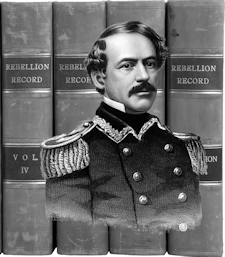January 31. — Wm. H. Seward, Secretary of State, directed to-day the release from Fort Lafayette of all the persons taken on board of vessels which had violated the blockade.—Baltimore American, February 3.
—George W. McCaddon, Sylvester Bartlett, and Amon Wells, of Harmar, and Wm. C. Olney, of Marietta, Ohio, were in Kentucky with a company who were putting up a telegraph line for the National army, and were captured by a party of rebels near Campbellsville, by whom they were taken South.—Ohio Statesman, February 8.
—Queen Victoria this day declared her determined purpose “to observe the duties of neutrality during the existence of hostilities between the United States and the States calling themselves ‘the Confederate States of America,'” and “to prevent, as far as possible, the use of her Majesty’s harbors, ports and coasts, and the waters within her Majesty’s territorial jurisdiction, in aid of the warlike purposes of either belligerent.”
—As act was passed to day in the Congress of the United States, authorizing the President to take possession of the telegraph and railroad lines in the United States, whenever, in his judgment, the public safety required it. Also, that any attempt to resist the unrestrained use by Government of such property, when too powerful to be suppressed by ordinary means, shall be punished by death, as a military offence. It was also enacted that three Commissioners be appointed by the President to assess and determine the damages suffered by railroad or telegraph companies in consequence of such seizures, the compensation of each Commissioner to be eight dollars per day while in active service. It was further enacted that the transportation of troops, munitions of war, etc., be under the immediate control of the Secretary of War, and such agents as he may appoint. Finally, the provisions of this act, so far as it relates to the operating and using said railroads and telegraphs, shall not be in force any longer than is necessary for the suppression of this rebellion.



